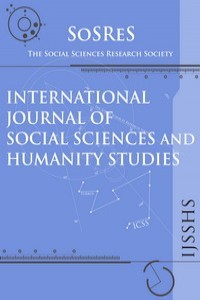NO MAN IS AN ISLAND: SOCIAL DISTANCE, NETWORK FLOW, AND OTHER-REGARDING BEHAVIORS IN A NATURAL FIELD EXPERIMENT
NO MAN IS AN ISLAND: SOCIAL DISTANCE, NETWORK FLOW, AND OTHER-REGARDING BEHAVIORS IN A NATURAL FIELD EXPERIMENT
Volunteering, Social distance, Network flow Natural field experiment, Other-regarding behaviors,
___
- Andreoni, J. and R. Petrie. (2004). “Public goods experiments without confidentiality: a glimpse into fund-raising”. Journal of Public Economics, 88(7-8), 1605-1623.
- Charness, G. and U. Gneezy. (2008). “What is in a name? anonymity and social distance in dictator and ultimatum games”. Journal of Economic Behavior and Organization, 68, 29-35.
- Chen, Yan and X.S. Li. (2009). “Group identity and social preferences”. American Economic Review, 99, 431-457.
- Fong, C. M. and E. F.P. Luttmer. (2010). “Do fairness and race matter in generosity? evidence from a nationally representative charity experiment". Journal of Public Economics, 95 (5-6), 372-94
- List, J.A. and M.K. Price. (2009). “The role of social connections in charitable fundraising: Evidence from a natural field experiment”. Journal of Economic Behavior and Organization, 69, 160-169.
- Möbius, M. and A. Szeidl. (2007). “Trust and social collateral”. NBER Working paper, 13126. Roth, A. (1995). “Bargaining experiments”. The Handbook of Experimental Economics. Princeton University Press, Princeton, New Jersey, 253–348.
- Tajfel, H. and J. C. Turner. (1979). “An integrative theory of intergroup conflict”. In W. G. Austin and S. Worchel (Eds.). The social psychology of intergroup relations. Monterey, CA, Brooks-Cole.
- Başlangıç: 2009
- Yayıncı: Sosyal Bilimler Araştırmaları Derneği
MANAGEMENT TRAINING PROGRAMME CHARACTERISTICS IN LATVIA
URBAN RENEWAL AS AN URBAN HEGEMONY PROJECT
Gönül İÇLİ, Pınar KAYA ÖZÇELİK
EXPLORING THE UNDERREPRESENTATION OF PRAGMATIC COMPETNECE IN THE L2 CLASSROOMS IN IRAN
Azizullah Mirzaei, Masoumeh Seyyed Rezaei
PROTECTION OF CHILDREN IN MALAYSIA THROUGH FOSTER CARE LEGISLATION AND POLICY
Azizah Mohd, Nadhilah A. Kadir
SOCIO-ECONOMIC DETERMINANTS OF POVERTY AMONGST FEMALE-HEADED HOUSEHOLDS IN A SOUTH AFRICAN TOWNSHIP
YOUNGSTERS AND SOCIAL POLICIES OF SUPPORT DURING CRISIS
Gheorghiţa Nistor, Mirela Anghel
FOOD AND IDENTITY AMONG MIGRANTS LIVING IN SLOVAKIA
